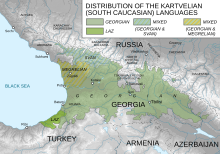Mingrelian language
| Mingrelian | |
|---|---|
| მარგალური ნინა margaluri nina | |
| Native to | Georgia |
| Region | Samegrelo, Abkhazia |
| Ethnicity | Mingrelians |
|
Native speakers
|
(500,000 cited 1989) |
| Georgian script | |
| Language codes | |
| ISO 639-3 | |
| Glottolog | ming1252 |
 |
|
Mingrelian or Megrelian (მარგალური ნინა margaluri nina) is a Kartvelian language spoken in Western Georgia (regions of Samegrelo and Abkhazia), primarily by Mingrelians. The language was also called Iverian (Georgian iveriuli ena) in the early 20th century. Because for more than a thousand years Mingrelian has held only a regional status within Georgia, the number of its speakers has been decreasing in favor of the national language, with UNESCO designating it as a "definitely endangered language".
No reliable figures exist for the number of Mingrelian native speakers, but it is estimated to be between 500,000 and 800,000. Most speakers live in the Samegrelo (Mingrelia) region of Georgia, that comprises the Odishi Hills and the Kolkheti Lowlands, from the Black Sea coast to the Svan Mountains and the Tskhenistskali River. Smaller enclaves existed in Abkhazia, but the ongoing civil unrest there has displaced many Mingrelian speakers to other regions of Georgia. Their geographical distribution is relatively compact, which has helped to promote the transmission of the language between generations.
Mingrelian is generally written with the Georgian alphabet, but has no written standard or official status. Almost all speakers are bilingual; they use Mingrelian mainly for familiar and informal conversation, and Georgian (or, for expatriate speakers, the local official language) for other purposes.
In the summer of 1999, books of the Georgian poet Murman Lebanidze were burned in the Mingrelian capital, Zugdidi, after he made disparaging remarks about the Mingrelian language.
Mingrelian is one of the Kartvelian languages. It is closely related to Laz, from which it has differentiated mostly in the last 500 years, after the northern (Mingrelian) and southern (Laz) communities were separated by Turkic invasions. It is somewhat less closely related to Georgian (the two branches having separated in the first millennium BC or earlier) and even more distantly related to Svan (which is believed to have branched off in the 2nd millennium BC or earlier). Mingrelian is not mutually intelligible with any of those other languages, although it is said that its speakers can recognize many Laz words.
...
Wikipedia
